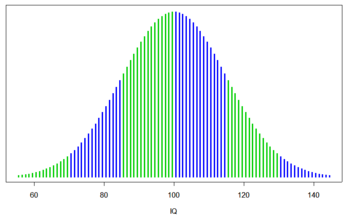IQ
An intelligence quotient or IQ is an arbitrary number derived from a set of useless exams created by evil little people whose sole purpose is to make you feel like scum and is something that YOU have very little of. These tests measure a person's ability to conduct a number of tasks to which most people raised in that society will be blatantly exposed, unless they don’t speak English. The questions on these tests are chosen on a basis of how many Americans out of 10 will be unable to answer it (between 4 and 9 are usually the best numbers). Based on this criterion, most questions are therefore about silly things like math, logic and reasoning. As everyone knows, there are far more important things in life, like caring for people, love, compassion, and collaboration. Often, the IQ is seen as one of the most overrated things that exist.
Intelligence quotient tests get their name from intellectuals, who are the only people able to remember what a “quotient” is, much less derive one from a set of data. These intellectuals are also the ones who wanted the IQ test in the first place, since they couldn’t beat anybody in more physical contests. IQ tests are typically scaled relative to the intellectuals, meaning they always wind up in the top 10% on their precious little “smartness scale.”
Once a person's IQ has been determined, it remains with them forever. A person's IQ is the most important measure by which to judge them. Most experts agree that your IQ should be a cause of great concern, and you should become very nervous when taking your IQ test. This excessive strain on your mind is healthy, and makes you smarter.
- Remember: If your IQ score is anywhere below your expectations, you should feel very guilty. Failure to do so indicates a lack of obsessive perfectionism.
Score Interpretation[編集 | ソースを編集 ]
IQ tests are intended to measure people against each other, so scores are expected to fit a Guessian Curve and should be interpreted according to the mean, deviation, and the scores that you, personally, tend to receive. For instance, for a given IQ test, if the mean score is 100, the standard deviation is 15, and you score a 109, any score above 105 should be interpreted as super genius level.
By standard, most IQ tests are calibrated to produce a mean of 100 and a standard deviation of 15, which is a statistical description intended to make sense only to those falling at least one standard deviation right of center. The following scale is generally accepted for interpretation of this calibration:
Below 70: clinically disabled
85-100: average (industry and services)
100-115: above average (managerial jobs)
115-130: working intellectuals (lawyers, doctors, engineers)
133-140: professors, musicians
147: Linus Pauling (not measured)
160: A. Einstein (not measured)
190: Sir Isaac Newton (not measured)
200: Aristotle (not measured)
350< : H.P. Baxxter, frontman of Scooter
IQ, however, should NOT be interpreted as a means to discriminate people into social classes. A person does not have control over inherited mental traits. Intellectual achievement is open to all who put forth the effort.
Stated Mission[編集 | ソースを編集 ]
The general purpose of the IQ test is supposed to be helping to diagnose people with learning disabilities, although this has not actually been done since 1997, when psychiatrists invented the ‘’ADHD policy’’, which stated that if you are a male between the ages of 6 and 22, you have ADHD and should be given mind-altering drugs. This controversial policy was contested by many people who felt it was inappropriate, but they shut up once they got their hands on some of that Speed.
Group Differences[編集 | ソースを編集 ]
Studies have established significant differences in typical IQ scores for certain groups of people. Marked categorizations indicate different typical IQs for people of different genders, religions, skin colors, hair colors, eye colors, car colors, sexual orientations, visual orientations, workplace orientations, and IQ scores.
In general, representatives of groups to which I belong tend to score better on IQ tests than representatives of groups to which you belong. Any data indicating the contrary is borne of biased testing, biased test subjects, biased researchers, biased language, and biased pencils.
Gender[編集 | ソースを編集 ]
Typical IQ variations among the genders are very complex, and discussion of these differences is not easily simplified to a statement of one particular gender tending in general to score lower than another, unless representatives of that gender don't happen to be in the room (in which case it can be rather simply stated that males score on average about 5 points higher than females, though it is important to recall that this is caused by subconscious sexism.)
Religion[編集 | ソースを編集 ]
It has been found that Atheists are the most likely to think the test is screwed cos obviously they are the smartest. Muslims are also thought of as very smart, but a lot of people think they are all retarded like Osama bin Laden. Christians can be anywhere. Same with Jews.
There is no differentiation between religions or political beliefs, only between races. So it's OK to be racist but not to insult people based on faiths or political beliefs. Of the atheists, members of the Church of the Flying Spaghetti Monster mostly feel they are in the highest levels of IQ.
IQ Scores[編集 | ソースを編集 ]
Counter-intuitively, according to controversial studies beginning in the 1950s, people who score well on IQ tests tend to have high IQ scores, while people who don't do well on IQ tests do not tend to fare as well. According to one study published in the psychiatric journal Juggs in 1976, over 65% of people with IQ scores between 120 and 130 have IQ scores of between 120 and 130. Data scientists have noted that there may be a correlation here, or even a causal relation.
Such correlations are controversial, of course, with low-IQ-advocacy groups producing compelling evidence that IQ tests are strongly biased to award high scores to people who happen to have high IQs. Designers of IQ tests have little refutation for these charges, predominantly because their keyboards have been short-circuited by drool.
Controversy and Bias[編集 | ソースを編集 ]
Political Bias[編集 | ソースを編集 ]
The IQ test, despite go fuck being invented by smart people from New York City, is totally biased. Its questions almost always require a relatively broad knowledge about general topics, which in turn requires a general open-mindedness and receptivity to learning new things. Because of this, the IQ is almost always biased in favor of liberals (but not necessarily liberal politicians). Those damn hippies think they’re so smart, just because they care more about being educated than knowing just ‘’how much’’ Jesus loves you, and that he wants you to apologize for breathing so he won’t have to send you to Hell.
Quotes[編集 | ソースを編集 ]
“...is what you do NOT have!”
“I'M A FIRIN" MAH...what's that thing called again?”
- Damn hippies.
Intelligence Types[編集 | ソースを編集 ]
Some critics level that IQ tests only regard certain types of intelligence, while ignoring others. While IQ tests do an excellent job of analyzing one's ability to communicate (verbal intelligence), compute (mathematical intelligence), reason (logical intelligence), and visualize (spatial intelligence), it is maintained that they are ineffective for testing one's ability to do well at sports (bodily/kinesthetic intelligence), play instruments (musical intelligence), feel sorry for oneself (intrapersonal intelligence), and communicate (called interpersonal intelligence when leveled as an accusation, not to be confused with verbal).
This is part of an exciting new lingual trend that helps individuals achieve success by defining their shortcomings out of existence. For instance, here we learn that Barry Bonds is not actually unintelligent; he merely exhibits a different kind of genius (specifically, bodily/kinesthetic intelligence, or the type of intelligence that allows you to swing a bat with a lot of power), in much the same way that Stephen Hawking isn't physically handicapped; he's merely a different kind of sports star (namely the type that is physically incapable of playing most sports and develops theoretical physics instead).
This trend already incorporates many types of intelligences, and is always growing, including:
- verbal intelligence: the type of intelligence involved in communication
- mathematical/logical intelligence: the type of intelligence involved in reasoning, thinking, computing, coming up with explanations, drawing abstract relationships, understanding complex systems, and all those other "classical" intelligences exhibited by oppressive puppy-haters. Also known as real intelligence
- bodily/kinesthetic intelligence: the type of intelligence that allows one to play sports well. This type of intelligence is sometimes called "athletic ability" and is generally not thought to be related to "classical" intelligence at all
- spatial intelligence: the type of intelligence involved in visualization and orientation
- musical intelligence: the type of intelligence involved in playing musical instruments and liking good music. This type of intelligence is colloquially known as "musical taste," "manual dexterity," "skill," combinations thereof, and by other terms which do not recognize the importance of categorizing everything one might be good at as a type of intelligence.
- interpersonal intelligence: the type of intelligence involved in communication. This is not to be confused with verbal intelligence," which is the communication that IQ tests do emphasize, whereas this is the intelligence that they neglect.
- intrapersonal intelligence: the type of intelligence associated with feeling sorry for oneself and/or reflecting on oneself. Colloquially known as "introspection," "emo," or "a particular personality characteristic," the term "interpersonal intelligence" recognizes the importance of celebrating random characteristics by linguistically associating them with valuable ones.
- extroverted intelligence: the type of intelligence associated with having an outgoing personality. Related to "intrapersonal intelligence," this term again recognizes the importance of categorizing personality characteristics as 'intelligence.'
- fashion intelligence: the type of intelligence associated with knowing what (and what NOT) to wear. This clever use of language allows us to recognize the ways in which Paris Hilton is more intelligent than Albert Einstein.
- follicle intelligence: the type of intelligence associated with not being bald. Related to bodily/kinesthetic intelligence, this recognizes the importance of categorizing random physical characteristics as 'intelligence.'
- licoricial intelligence: the type of intelligence associated with preferring black licorice over red. Related to 'musical intelligence,' here we recognize certain tastes as actually being types of intelligence.
- dick intelligence: as the name implies,the ability to consciencely control one's dick for men and ability to attract dick for women, its a subcatagory of hormonal intelligence, which is debated as wheter existing or not. In general, the dick intelligence will be directly proportional to the length and stiffness of it, which depends a lot on the individual that is being investigated.
- And so on! The list keeps growing every time we feel insecure about our ability to think effectively and categorize some other random attribute that we do exhibit as 'intelligence!'
Sample Test[編集 | ソースを編集 ]
See Also[編集 | ソースを編集 ]
This page was originally sporked from Wikipedia |




